By Leen Randell
Updated: Jul 10, 2024
10 Best Herbal Decoctions For Wheezing
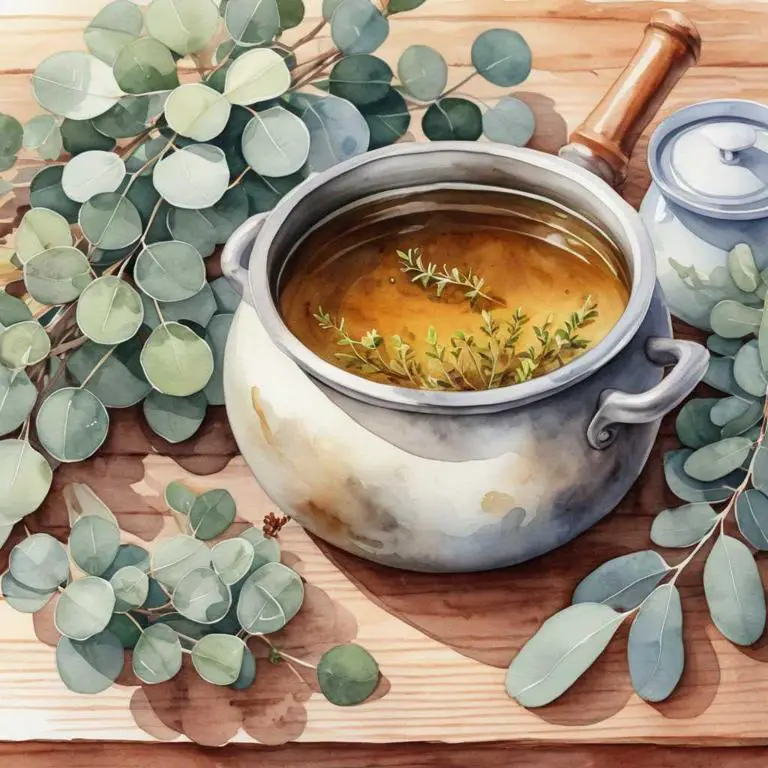
Herbal decoctions for wheezing are concentrated liquid extracts made by boiling herbs in water, which can provide effective relief from wheezing caused by respiratory issues such as asthma or bronchitis.
These herbal concoctions help to soothe and relax the airways, reducing inflammation and congestion that can cause wheezing.
Examples of herbal decoctions that show promise in alleviating wheezing include those made with marshmallow root, licorice root, and thyme, which have been shown to reduce symptoms and improve quality of life for individuals suffering from respiratory conditions.
The following article describes in detail the most important decoctions for wheezing, including medicinal properties, parts of herbs to use, and recipes for preparations.
- 1. Eucalyptus globulus
- 2. Glycyrrhiza glabra
- 3. Thymus vulgaris
- 4. Mentha x piperita
- 5. Lavandula angustifolia
- 6. Hyssopus officinalis
- 7. Malva sylvestris
- 8. Taraxacum officinale
- 9. Verbena officinalis
- 10. Matricaria chamomilla
- What is the best combination of herbal decoctions to use for wheezing?
- What ailments similar to wheezing are treated with herbal decoctions?
1. Eucalyptus globulus
Tasmanian blue gum decoctions helps with wheezing because of its natural anti-inflammatory and expectorant properties.
The decoction's active compounds, such as eucalyptol and cineole, work to relax the airway muscles, reducing constriction and making it easier to breathe. Additionally, the decoction's mucolytic properties help break down excess mucus, allowing for a more effective clearance of the airways.
This combination of actions helps to alleviate wheezing symptoms, providing relief for individuals suffering from respiratory conditions such as bronchitis, asthma, and chronic obstructive pulmonary disease (COPD).
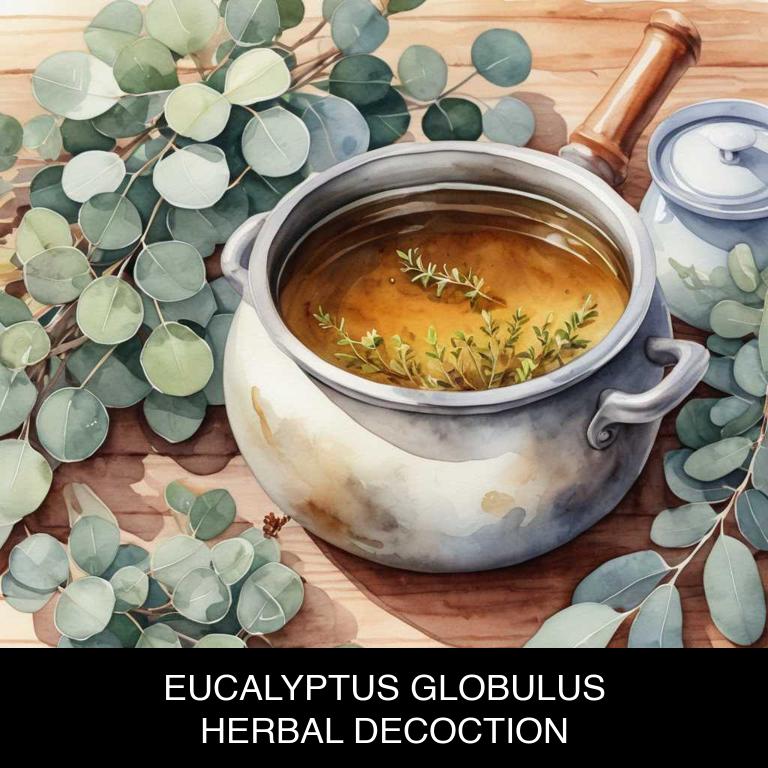
Medicinal Constituents
The list below shows the primary medicinal constituents in Eucalyptus globulus decoctions that help with wheezing.
- Eucalyptol: A primary terpene in Eucalyptus globulus, eucalyptol helps with wheezing by acting as a bronchodilator, relaxing airway muscles and facilitating easier breathing.
- Cineole: Also known as eucalyptol, cineole is another significant terpene that reduces wheezing by its expectorant properties, helping to relieve congestion and mucus buildup in the airways.
- Quercetin: A flavonoid phenolic compound in Eucalyptus globulus, quercetin has anti-inflammatory properties that help alleviate wheezing by reducing inflammation and oxidative stress in the lungs and airways.
Parts Used
The list below shows the primary parts of tasmanian blue gum used to make decoctions for wheezing.
- Leaves: Their high eucalyptol content helps to open airways and relieve congestion.
- Barks: The antibacterial and anti-inflammatory properties in the bark may help to soothe respiratory issues and reduce inflammation.
- Stems: The leaves on the stems contain eucalyptol, which, when released into the air, can help to ease wheezing and congestion.
Quick Recipe
The following recipe gives a procedure to make a basic tasmanian blue gum for wheezing.
- Gather fresh or dried eucalyptus globulus leaves and store them in a cool dark place for up to a year.
- Measure out 1-2 teaspoons of dried leaves or 2-3 sprigs of fresh leaves for every 8 ounces of water.
- Combine the measured eucalyptus globulus with 8 ounces of boiling water in a heat-resistant glass or ceramic container.
- Steep the mixture for 5-10 minutes or until the liquid has cooled slightly and the flavors have melded together.
- Strain the decoction through a fine-mesh sieve or cheesecloth into a separate container and discard the solids.
2. Glycyrrhiza glabra
Licorice decoctions helps with wheezing because it contains a compound called glycyrrhizin, which has anti-inflammatory properties.
When brewed into a decoction, licorice root can help soothe and calm the respiratory tract, reducing inflammation and constriction in the airways that can cause wheezing. Additionally, licorice has natural expectorant properties, helping to loosen and clear out mucus and phlegm that may be contributing to wheezing symptoms.
By addressing these underlying causes, licorice decoctions can help alleviate wheezing and provide relief from respiratory discomfort.

Medicinal Constituents
The list below shows the primary medicinal constituents in Glycyrrhiza glabra decoctions that help with wheezing.
- Glycyrrhizin: This triterpenoid saponin helps with wheezing by its anti-inflammatory properties, which reduce inflammation and congestion in the airways.
- Liquiritigenin: This isoflavone helps with wheezing by its bronchodilatory effect, which relaxes the airway muscles and facilitates easier breathing.
- Isoliquiritigenin: This isoflavone also exhibits bronchodilatory properties, which help to open up the airways and alleviate wheezing symptoms.
Parts Used
The list below shows the primary parts of licorice used to make decoctions for wheezing.
- Roots: The roots of Glycyrrhiza glabra are primarily used due to their high content of glycyrrhizin, a compound with anti-inflammatory and expectorant properties that can help alleviate wheezing.
- Stems: The stems of the plant contain flavonoids and saponins, which are known for their anti-inflammatory and bronchodilatory properties, making them useful in treating wheezing.
Quick Recipe
The following recipe gives a procedure to make a basic licorice for wheezing.
- Harvest 30-40g of fresh glycyrrhiza glabra roots or 90-120g of dried roots in the early morning.
- Wash the roots thoroughly with cold water to remove any dirt or debris.
- Chop the roots into small pieces and combine them with 1 liter of boiling water.
- Reduce the heat to low and simmer for 10-15 minutes or longer to increase the bioavailability.
- Strain the decoction through a cheesecloth or a fine-mesh sieve into a clean container.
3. Thymus vulgaris
Thyme decoctions helps with wheezing because of its natural expectorant properties, which help to loosen and clear mucus from the airways.
The antioxidants present in thyme also help to reduce inflammation in the lungs, making it easier to breathe. Additionally, thyme's anti-inflammatory compounds can help to relax bronchial muscles, allowing for smoother airflow and reducing wheezing sounds.
By soothing and calming the respiratory tract, thyme decoctions provide natural relief from wheezing and other breathing difficulties.
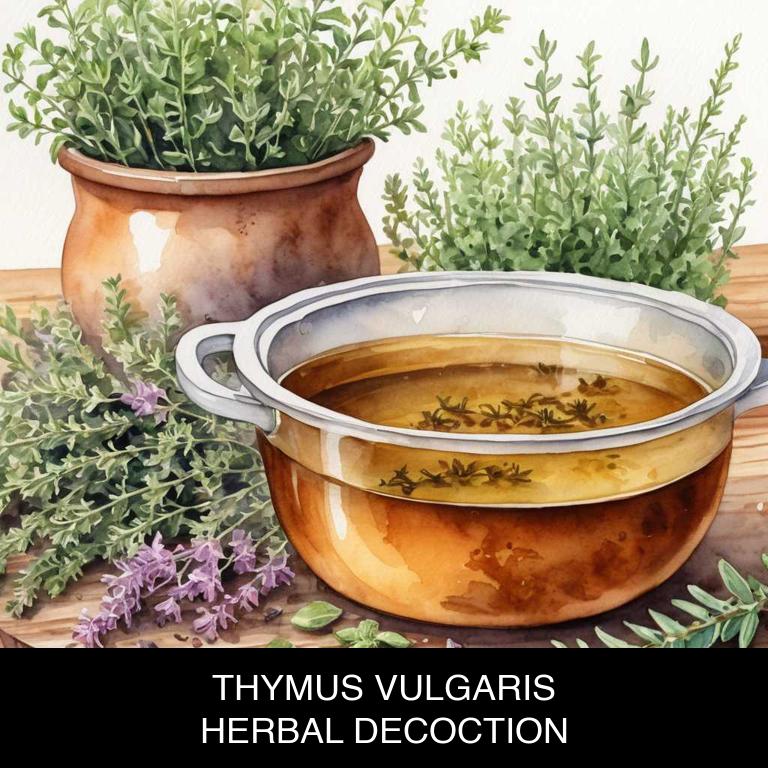
Medicinal Constituents
The list below shows the primary medicinal constituents in Thymus vulgaris decoctions that help with wheezing.
- Thymol: Thymol has anti-inflammatory and antioxidant properties, which help in reducing inflammation and oxidative stress in the airways, thereby alleviating wheezing symptoms.
- Carvacrol: Carvacrol, a phenolic compound, exhibits bronchodilatory effects, which help in relaxing airway muscles and improving airflow, thus relieving wheezing.
- Bornyl acetate: Bornyl acetate, a terpene, possesses mucolytic properties, which help in breaking down mucus and reducing its viscosity, making it easier to expel and relieving wheezing associated with excessive mucus production.
Parts Used
The list below shows the primary parts of thyme used to make decoctions for wheezing.
- Leaves: They are used for their expectorant and antispasmodic properties, helping to relieve congestion and ease wheezing.
- Stems: The stems of Thymus vulgaris contain essential oils, which are used to calm the respiratory system and reduce wheezing.
- Flowers: The flowers of the plant are used for their antispasmodic and expectorant properties, helping to ease respiratory discomfort and wheezing.
Quick Recipe
The following recipe gives a procedure to make a basic thyme for wheezing.
- Gather 2 tablespoons of dried thymus vulgaris leaves from a reputable source and store in an airtight container.
- Weigh and measure the dried thymus vulgaris leaves to ensure accuracy and consistency in dosages.
- Combine the measured dried thymus vulgaris leaves with 4 cups of boiling water in a heat-resistant glass container.
- Steep the mixture for 10 to 15 minutes or until the liquid has reduced slightly and cooled slightly.
- Strain the liquid through a cheesecloth or a fine-mesh sieve into a clean glass container and discard the solids.
4. Mentha x piperita
Peppermint decoctions helps with wheezing because of its natural anti-inflammatory properties, which help to reduce swelling in the airways.
The menthol in peppermint also helps to relax the muscles in the lungs and bronchial tubes, making it easier for mucus to be cleared out of the body. Additionally, peppermint's expectorant properties help to thin out mucus, making it easier to cough up and reducing wheezing symptoms.
Overall, peppermint decoctions can provide quick relief from wheezing by helping to open up airways and reduce congestion.
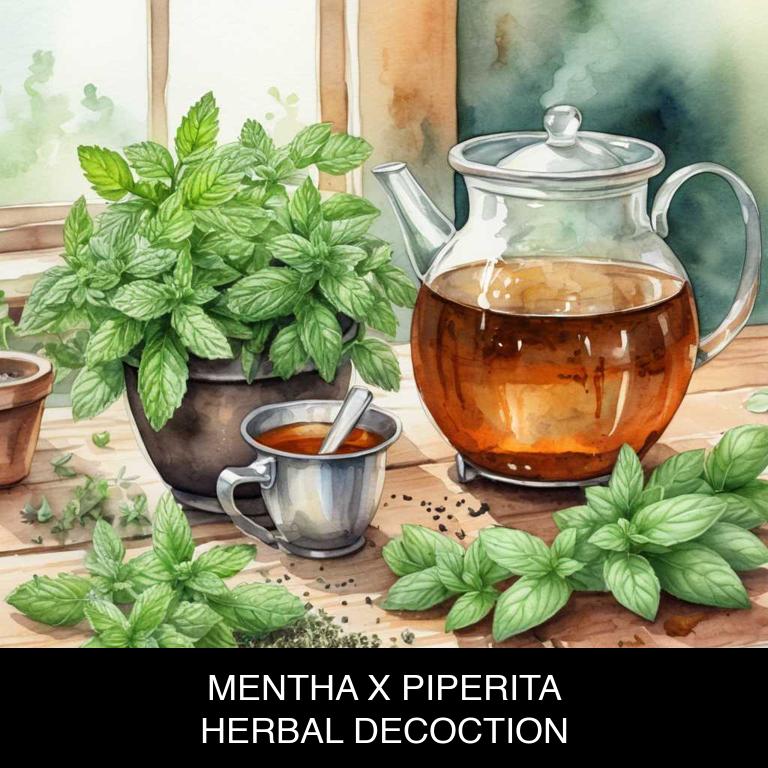
Medicinal Constituents
The list below shows the primary medicinal constituents in Mentha x piperita decoctions that help with wheezing.
- Menthol: Menthol helps with wheezing by acting as a bronchodilator, relaxing airway muscles and improving breathing.
- Menthone: Menthone has anti-inflammatory properties, reducing inflammation in the airways and alleviating wheezing symptoms.
- Rosmarinic acid: Rosmarinic acid acts as an antioxidant and anti-inflammatory agent, protecting the airways from oxidative stress and inflammation, which can contribute to wheezing.
Parts Used
The list below shows the primary parts of peppermint used to make decoctions for wheezing.
- Leaves: Leaves are commonly used due to their high menthol and menthone content, which helps to ease respiratory congestion.
- Stems: Stems are often used because they contain volatile oils that can help to open airways and relieve wheezing.
- Roots: Roots are sometimes used for their antioxidant and anti-inflammatory properties, which can help to soothe and calm respiratory issues.
Quick Recipe
The following recipe gives a procedure to make a basic peppermint for wheezing.
- Gather 1-2 ounces of fresh or dried m x piperita leaves and flowers and rinse thoroughly with water.
- Chop the m x piperita plant material into small pieces to enhance extraction efficiency and heat tolerance.
- Combine the chopped plant material with 1 quart of boiling water in a heat-resistant container or teapot.
- Steep the m x piperita mixture for 5-7 minutes to allow for optimal extraction and flavor release.
- Strain the decoction through a cheesecloth or fine-mesh sieve into a clean container to remove solids.
5. Lavandula angustifolia
English lavender decoctions helps with wheezing because of its natural anti-inflammatory properties, which soothe and calm the respiratory tract.
The calming effects of lavender help to reduce inflammation in the airways, allowing for easier breathing and alleviating wheezing symptoms.
Additionally, lavender's expectorant properties help to loosen and clear mucus from the lungs, further reducing wheezing and promoting overall respiratory health.
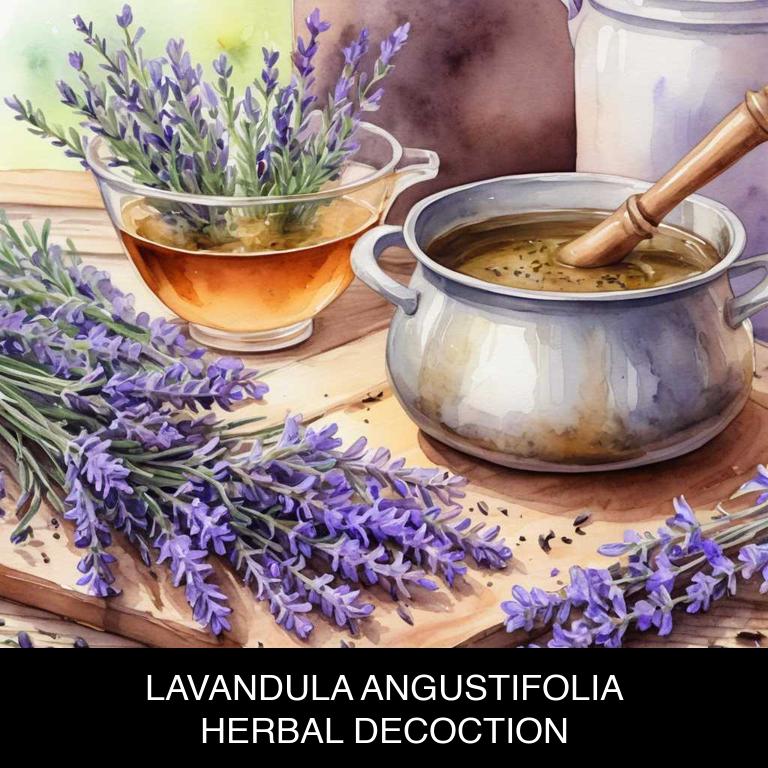
Medicinal Constituents
The list below shows the primary medicinal constituents in Lavandula angustifolia decoctions that help with wheezing.
- Linalool: This terpene acts as an anti-inflammatory and bronchodilator, helping to relax airway muscles and reduce wheezing symptoms.
- Linalyl acetate: A terpene ester, linalyl acetate has anti-inflammatory properties that help reduce airway inflammation and congestion, making it easier to breathe.
- Caffeic acid: A phenolic compound, caffeic acid exhibits anti-inflammatory and antioxidant properties, which help reduce airway inflammation and oxidative stress, thereby alleviating wheezing symptoms.
Parts Used
The list below shows the primary parts of english lavender used to make decoctions for wheezing.
- Leaves: Used due to their calming and anti-inflammatory properties, which help to reduce wheezing symptoms.
- Flowers: Employed because of their soothing and antispasmodic effects, which provide relief from wheezing and other respiratory issues.
- Stems: Utilized for their mild antispasmodic and anti-inflammatory properties, which contribute to easing wheezing and bronchial spasms.
Quick Recipe
The following recipe gives a procedure to make a basic english lavender for wheezing.
- Harvest 1/4 cup of fresh lavandula angustifolia flowers or 2 tablespoons of dried flowers for decoction.
- Dry the flowers in a single layer for 1 hour in a low-temperature oven at 150 degrees fahrenheit.
- Combine the dried flowers with 8 ounces of water in a saucepan and bring to a boil.
- Reduce heat and simmer the mixture for 10 to 15 minutes to release the herbal properties.
- Strain the liquid through a cheesecloth or fine-mesh sieve into a cup or container for consumption.
6. Hyssopus officinalis
Hyssop decoctions helps with wheezing because of its natural anti-inflammatory and expectorant properties.
The decoction's active compounds, including volatile oils and flavonoids, work to reduce inflammation in the airways, alleviating congestion and narrowing of the bronchial tubes that often accompany wheezing. Additionally, hyssop's mucolytic properties help break down mucus, making it easier to expel and relieving wheezing episodes.
By addressing these underlying issues, hyssop decoctions can provide effective relief from wheezing and promote improved breathing.
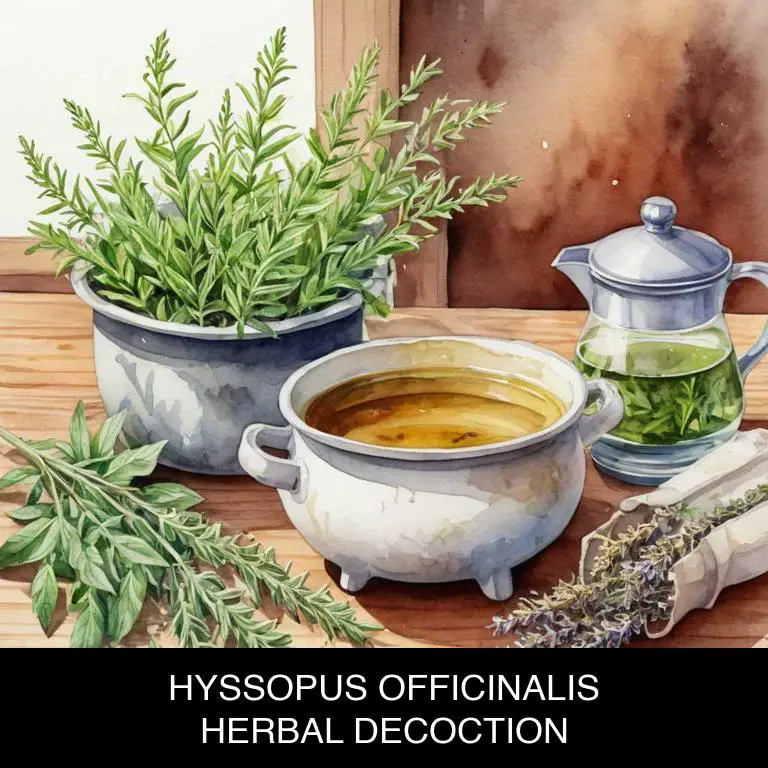
Medicinal Constituents
The list below shows the primary medicinal constituents in Hyssopus officinalis decoctions that help with wheezing.
- Rosmarinic acid: This phenolic compound has anti-inflammatory properties, which can help reduce inflammation in the airways and alleviate wheezing symptoms.
- Ursolic acid: A triterpenoid with anti-inflammatory and bronchodilatory effects, ursolic acid can help relax airway muscles and improve breathing in individuals with wheezing.
- Bornyl acetate: As a terpene, bornyl acetate has bronchodilatory properties, which can help dilate airways and improve airflow, reducing wheezing symptoms.
Parts Used
The list below shows the primary parts of hyssop used to make decoctions for wheezing.
- Leaves: Hyssopus officinalis leaves are commonly used due to their high essential oil content, which helps to relieve wheezing symptoms.
- Stems: Stems of the plant are used for decoctions as they contain aromatic compounds that can help to ease respiratory issues.
- Roots: The roots of Hyssopus officinalis are also used to make decoctions for wheezing due to their expectorant properties, which aid in loosening and removing mucus.
Quick Recipe
The following recipe gives a procedure to make a basic hyssop for wheezing.
- Harvest approximately 20g of fresh hyssopus officinalis leaves and flowers from the plant.
- Gently chop the harvested hyssopus officinalis material into small pieces using a sharp knife.
- Combine the chopped hyssopus officinalis with 250ml of boiling water in a heat-resistant glass cup.
- Steep the mixture for 5-7 minutes to allow the active compounds to infuse.
- Strain the decoction through a cheesecloth or fine-mesh sieve into a clean container.
7. Malva sylvestris
Mallow decoctions helps with wheezing because of its natural soothing properties that calm inflammation in the respiratory tract.
The mucilage present in mallow plants forms a protective barrier on the lungs' lining, reducing irritation and constriction of airways, which can cause wheezing sounds when breathing out. By loosening mucus and easing congestion, herbal mallow decoctions help to open up air passages, making it easier to breathe and relieving wheezing symptoms naturally.
This traditional remedy has been used for centuries to alleviate respiratory issues, offering a gentle yet effective solution for soothing the lungs and alleviating wheezing episodes.
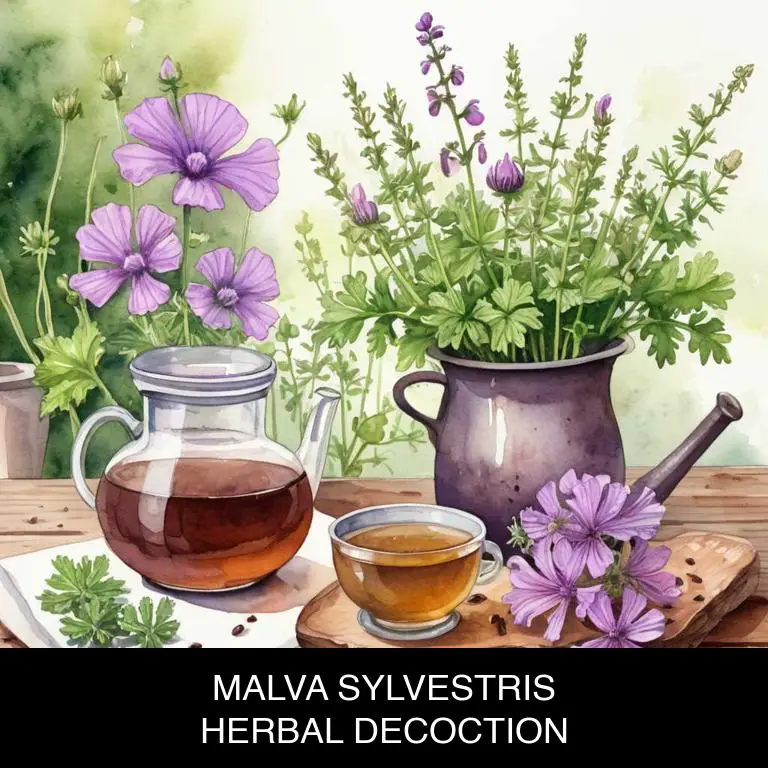
Medicinal Constituents
The list below shows the primary medicinal constituents in Malva sylvestris decoctions that help with wheezing.
- Alkaloids: Malva sylvestris contains alkaloids that help reduce inflammation in the airways, alleviating wheezing symptoms.
- Phenolic acids: Phenolic acids in Malva sylvestris decoctions have anti-inflammatory and antioxidant properties, which help to soothe and calm irritated airways, making it easier to breathe.
- Flavonoids: Flavonoids present in Malva sylvestris decoctions possess bronchodilatory effects, which help to relax airway muscles and improve airflow, thereby reducing wheezing.
Parts Used
The list below shows the primary parts of mallow used to make decoctions for wheezing.
- Leaves: Leaves are commonly used due to their high mucilage content, which helps to soothe and calm the respiratory tract.
- Flowers: Flowers are frequently used because they contain bioactive compounds that help to reduce inflammation and alleviate wheezing.
- Roots: Roots are often used due to their rich content of saponins, which have anti-inflammatory properties that can help to relieve wheezing symptoms.
Quick Recipe
The following recipe gives a procedure to make a basic mallow for wheezing.
- Collect 2 tablespoons of dried flowers from the malva sylvestris plant and rinse them with cold water.
- Steep the dried flowers in 1 quart of boiling water for 10 to 15 minutes.
- Strain the mixture through a cheesecloth or a fine-mesh sieve into a bowl.
- Discard the solids and transfer the liquid to a clean glass bottle or container.
- Store the decoction in the refrigerator for up to 3 days or freeze it for later use.
8. Taraxacum officinale
Dandelion decoctions helps with wheezing because of its natural anti-inflammatory properties, which reduce swelling in the airways and ease respiratory constriction.
The decoction's expectorant properties also help to loosen and clear out mucus, making it easier for the body to expel, thereby alleviating wheezing sounds.
Additionally, dandelion's ability to boost the immune system helps fight off infections that can trigger wheezing, promoting overall respiratory health and relief from wheezing symptoms.

Medicinal Constituents
The list below shows the primary medicinal constituents in Taraxacum officinale decoctions that help with wheezing.
- Luteolin: This flavonoid acts as a bronchodilator and anti-inflammatory agent, helping to relax airway muscles and reduce inflammation, which can contribute to wheezing.
- Taraxasterol: This triterpenoid saponin has anti-inflammatory and bronchodilatory properties, which can help alleviate wheezing by reducing inflammation and relaxing airway muscles.
- Quercetin: This flavonoid has potent anti-inflammatory and antioxidant properties, which can help reduce inflammation and oxidative stress in the airways, contributing to wheezing relief.
Parts Used
The list below shows the primary parts of dandelion used to make decoctions for wheezing.
- Leaves: The leaves are commonly used due to their high content of saponins, which help in reducing inflammation and relaxing airway muscles.
- Roots: The roots are used because they contain taraxasterol, a compound that has anti-inflammatory properties, which can help alleviate wheezing.
- Stems: The stems are used due to their high content of flavonoids, which have been shown to have anti-inflammatory and bronchodilatory effects, helping to relieve wheezing.
Quick Recipe
The following recipe gives a procedure to make a basic dandelion for wheezing.
- Harvest 20-30 fresh leaves from the taraxacum officinale plant for decoction preparation.
- Rinse the harvested leaves thoroughly with cold water to remove any dirt or debris.
- Combine the cleaned leaves with 1 liter of water in a saucepan and bring to a boil.
- Reduce heat and simmer the mixture for 10-15 minutes to allow the active compounds to release.
- Strain the decoction through a cheesecloth or a fine mesh to separate the liquid from the solids.
9. Verbena officinalis
Lemon verbena decoctions helps with wheezing because of its natural expectorant properties, which loosen and clear mucus from the lungs.
The decoction's flavonoids and volatile oils also help to relax bronchial muscles, reducing inflammation and congestion in the airways. Additionally, lemon verbena's antispasmodic properties can help to calm wheezing spasms, providing quick relief for individuals suffering from chronic respiratory issues like asthma or COPD.
By promoting easy breathing, herbal lemon verbena decoctions offer a natural remedy for alleviating wheezing and improving overall lung function.
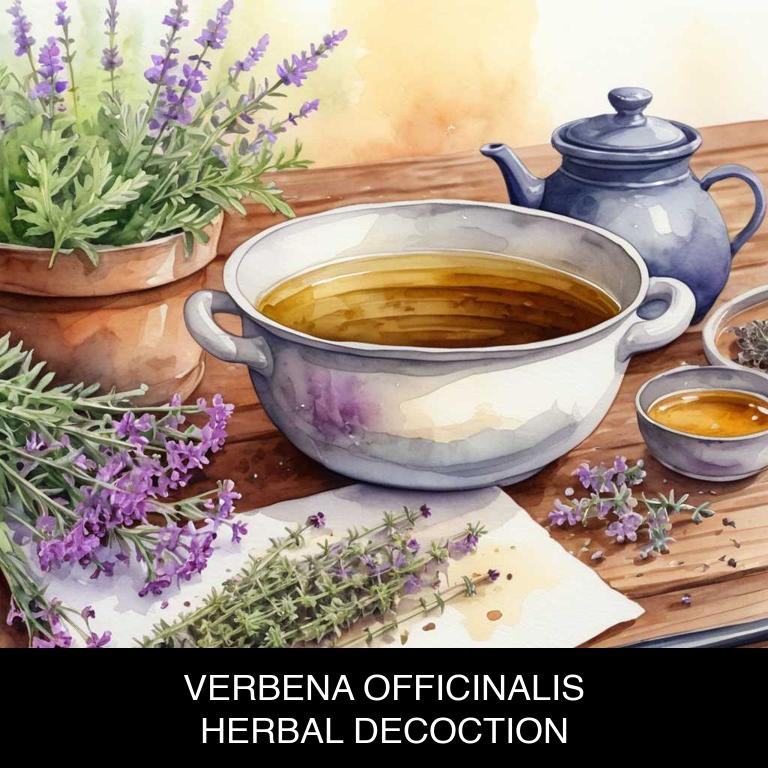
Medicinal Constituents
The list below shows the primary medicinal constituents in Verbena officinalis decoctions that help with wheezing.
- Verbascoside: This iridoid glycoside has anti-inflammatory properties, which help reduce airway inflammation and alleviate wheezing symptoms.
- Luteolin: A flavonoid antioxidant, luteolin helps to reduce airway inflammation and relax bronchial muscles, making it easier to breathe and relieving wheezing.
- Rosmarinic acid: An ester of caffeic and 3,4-dihydroxyphenylacetic acids, rosmarinic acid has anti-inflammatory and antioxidant properties that help to reduce wheezing by decreasing airway inflammation and protecting lung tissues.
Parts Used
The list below shows the primary parts of lemon verbena used to make decoctions for wheezing.
- Leaves: They are used due to their high content of volatile oils, which are believed to help alleviate respiratory issues.
- Roots: The roots are employed for their medicinal properties, including their ability to reduce inflammation and ease respiratory distress.
- Stems: The stems of Verbena officinalis contain essential oils and other compounds that are thought to help calm the respiratory system and relieve wheezing symptoms.
Quick Recipe
The following recipe gives a procedure to make a basic lemon verbena for wheezing.
- Harvest 20-30 fresh verbena officinalis leaves and flowers in the early morning to ensure optimal potency.
- Dry the harvested plant material in a warm place with good air circulation for 2 to 4 weeks.
- Crush 2-3 teaspoons of the dried verbena officinalis into a fine powder to facilitate infusion.
- Steep 1 teaspoon of the dried powder in 1 cup of boiling water for 5 to 10 minutes.
- Strain the decoction through a fine-mesh sieve or cheesecloth and discard the solids.
10. Matricaria chamomilla
Chamomile decoctions helps with wheezing because of its anti-inflammatory properties, which soothe and relax the airways, reducing inflammation and spasms that can cause wheezing.
The decoction's calming effects also help to ease coughing fits, allowing for easier breathing. Additionally, chamomile's antispasmodic properties help to open up constricted airways, making it easier for air to flow freely in and out of the lungs, thereby reducing wheezing symptoms.
This natural remedy can provide effective relief from wheezing discomfort.
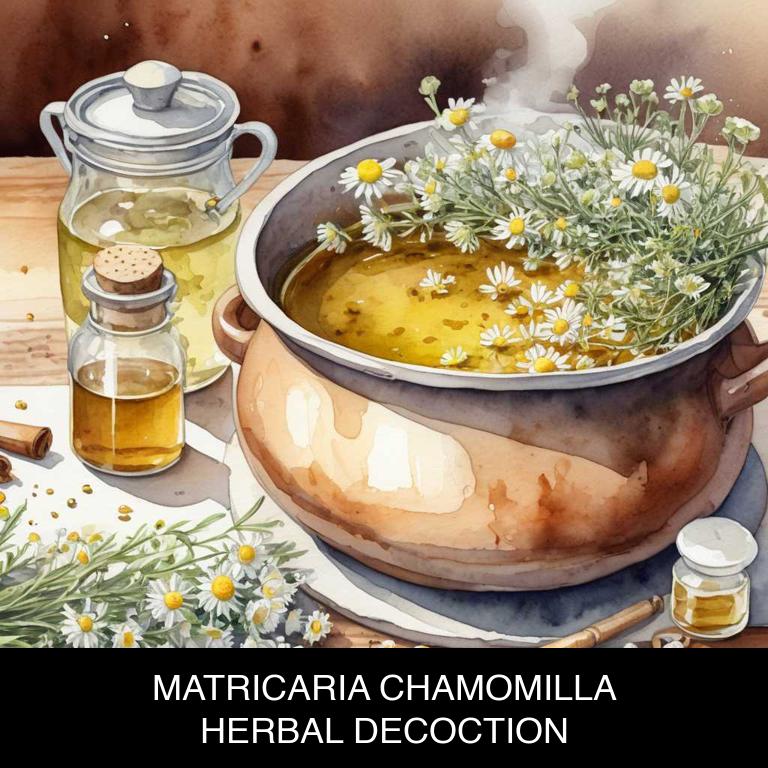
Medicinal Constituents
The list below shows the primary medicinal constituents in Matricaria chamomilla decoctions that help with wheezing.
- Apigenin: A flavonoid that acts as a bronchodilator, relaxing airway muscles and reducing inflammation, thereby easing wheezing.
- Bisabolol: A sesquiterpene alcohol with anti-inflammatory and antispasmodic properties, which helps reduce airway inflammation and alleviate wheezing attacks.
- Α-bisabolol oxide b: A sesquiterpene oxide that possesses bronchodilatory and anti-inflammatory effects, helping to relax airway muscles and reduce wheezing.
Parts Used
The list below shows the primary parts of chamomile used to make decoctions for wheezing.
- Flowers: They are rich in apigenin, an antihistamine that helps alleviate wheezing symptoms.
- Leaves: They contain flavonoids that possess anti-inflammatory properties, which can help reduce wheezing.
- Seeds: They are a source of apigenin, a natural antihistamine that can help relieve wheezing and other respiratory issues.
Quick Recipe
The following recipe gives a procedure to make a basic chamomile for wheezing.
- Gather 2 tablespoons of dried matricaria chamomilla flowers and rinse them under cold running water.
- Combine the matricaria chamomilla flowers with 2 cups of boiling water and let steep for 5 minutes.
- Strain the mixture through a cheesecloth or a fine-mesh sieve into a clean container.
- Discard the solids and store the liquid in the refrigerator for up to 24 hours.
- Use 1 to 2 tablespoons of the decoction 2 to 3 times a day as needed.
What is the best combination of herbal decoctions to use for wheezing?
The best combination of herbal decoctions that help with wheezing is a blend of thyme, eucalyptus, and licorice root.
Thyme is known for its anti-inflammatory properties, while eucalyptus helps to clear airway congestion. Licorice root soothes and protects the mucous membranes, reducing inflammation and irritation. By brewing a decoction of these herbs, individuals can create a natural remedy to alleviate wheezing symptoms and promote respiratory health.
This combination has been traditionally used to calm the airways and ease breathing.
What ailments similar to wheezing are treated with herbal decoctions?
Ailments similar to wheezing/decoctions.html">wheezing/decoctions.html">wheezing that are treated with herbal decoctions are respiratory problems such as bronchitis, asthma, and chronic coughs.
Herbal remedies like turmeric, ginger, and slippery elm help to soothe and calm the airways, reducing inflammation and congestion.
Other herbs like thyme, eucalyptus, and peppermint also provide relief by loosening mucus and opening up air passages.